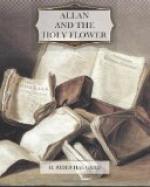We rowed past the island, on which I observed the ruins of an old Portuguese fort and some long grass-roofed huts, where, I reflected, the slaves were probably kept until they could be shipped away. Observing my glance fixed upon these, Hassan hastened to explain, through Sammy, that they were storehouses in which he dried fish and hides, and kept goods.
“How interesting!” I answered. “Further south we dry hides in the sun.”
Crossing a narrow channel we arrived at a rough jetty where we disembarked, whence we were led by Hassan not to the village which I now saw upon our left, but to a pleasant-looking, though dilapidated house that stood a hundred yards from the shore. Something about the appearance of this house impressed me with the idea that it was never built by slavers; the whole look of the place with its verandah and garden suggested taste and civilisation. Evidently educated people had designed it and resided here. I glanced about me and saw, amidst a grove of neglected orange trees that were surrounded with palms of some age, the ruins of a church. About this there was no doubt, for there, surmounted by a stone cross, was a little pent-house in which still hung the bell that once summoned the worshippers to prayer.
“Tell the English lord,” said Hassan to Sammy, “that these buildings were a mission station of the Christians, who abandoned them more than twenty years ago. When I came here I found them empty.”
“Indeed,” I answered, “and what were the names of those who dwelt in them?”
“I never heard,” said Hassan; “they had been gone a long while when I came.”
Then we went up to the house, and for the next hour and more were engaged with our baggage which was piled in a heap in what had been the garden and in unpacking and pitching two tents for the hunters which I caused to be placed immediately in front of the rooms that were assigned to us. Those rooms were remarkable in their way. Mine had evidently been a sitting chamber, as I judged from some such broken articles of furniture, that appeared to be of American make. That which Stephen occupied had once served as a sleeping-place, for the bedstead of iron still remained there. Also there were a hanging bookcase, now fallen, and some tattered remnants of books. One of these, that oddly enough was well-preserved, perhaps because the white ants or other creatures did not like the taste of its morocco binding, was a Keble’s Christian Year, on the title-page of which was written, “To my dearest Elizabeth on her birthday, from her husband.” I took the liberty to put it in my pocket. On the wall, moreover, still hung the small watercolour picture of a very pretty young woman with fair hair and blue eyes, in the corner of which picture was written in the same handwriting as that in the book, “Elizabeth, aged twenty.” This also I annexed, thinking that it might come in useful as a piece of evidence.




